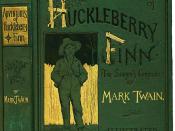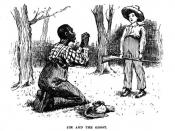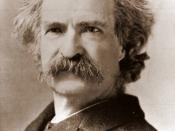Adventures of Huckleberry Finn by Mark Twain has been heatedly attacked as a novel of racism for decades when, in fact, it is one of the "most anti-racist books ever written in America" (Pinsker 649). Critics have debated this topic since 1885, only to cause more pain than comfort for those who feel put down by the novel. Although some feel Adventures of Huckleberry Finn is a racist novel, which it may appear to be superficially, a deeper readinghas revealed the true feelings of equality Twain strives to express through his work.
Some critics feel Mark Twain promoted racism and slavery through the theme displayed in Adventures of Huckleberry Finn. Those who feel this way attack the use of the word "nigger" as their main argument, claiming it alone makes the novel a racist work of literature. Lance Morrow proves this by stating, "The supposedly racially insensitive tale, with it's repeated use of the word 'nigger', is the most devastating portrait of American white trash and white trash racism that has ever been written" (27).
Another critic, David Sloan, claims the word is used "204 times, or more" expressing how he feels it "introduces the theme of race hate" and "degrades Jim, showing him as a bad role model" (120). Sloan also claims Jim is an allegory to "all people of African origin" and is used to prove that people of African descent are "nigger[s] and wouldn't understand" (120-121). Another critic simply sums up her ideas by saying, "Irony, history and racism all painfully intertwine in our past and present, and they all come together in Huck Finn [through the ideas and dialect used in the novel]" (Fishkin 4). What these critics fail to realize is that Mark Twain is only writing in a realism sense of his day.


